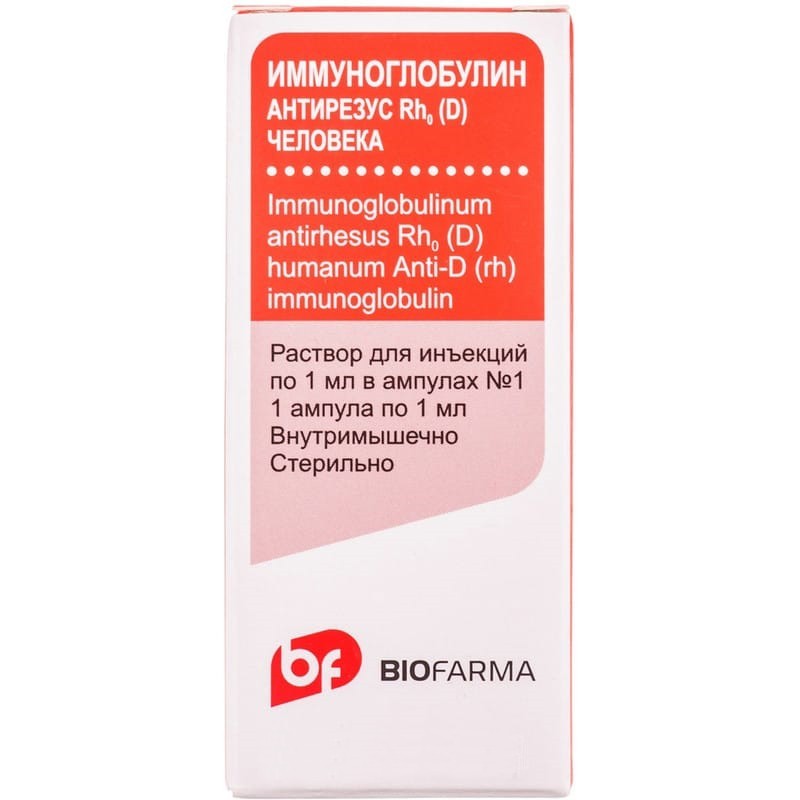



 Secure and encrypted payment processing
Secure and encrypted payment processing We ship to over 40 countries including the USA, UK, Europe, Australia and Japan
We ship to over 40 countries including the USA, UK, Europe, Australia and Japan Guaranteed refund or reship if you haven't received your order
Guaranteed refund or reship if you haven't received your orderThe drug is an immunologically active protein fraction of the serum or blood plasma of immunized (or immunized) donors, tested for the absence of antibodies to HIV-1, HIV-2, hepatitis C virus and surface hepatitis B virus antigen, purified and concentrated by the ethanol fractionation method, which passed the stage viral inactivation by solvent-detergent method, with a high content of anti-rho antibodies (d). the protein content in 1.0 ml of the drug is from 0.09 to 0.11 g. transparent or with slight opalescence, colorless or yellowish liquid. during storage, a slight precipitate may appear, disappearing with shaking. the drug does not contain preservatives and antibiotics.
The active drug base is immunoglobulin specific for Rh antigeno (D) The drug prevents Rh sensitization of Rh-negative women, possible as a result of Rho (D) -fetal positive blood into the mother’s bloodstream at birth Rho (D) -positive children, during termination of pregnancy (both spontaneous and artificial), in the case of an amniocentesis, while receiving injuries of the abdominal cavity during pregnancy.
Specific Anti-Rh Antibodieso(D) - 1,500 IU (300 μg immunoglobulin).
The drug should be administered in / m!
When applying, the following criteria must be considered:
Immunoglobulin is administered at 1500 IU (300 μg) IM once:
The drug is contraindicated: with selective iga deficiency, provided that antibodies to iga are present; in the presence of severe allergic reactions to the introduction of protein preparations of human blood in the anamnesis, as well as hypersensitivity reactions to human donor immunoglobulins. administration of the drug is contraindicated for Rh-positive women in labor, as well as Rh-negative women in labor sensitized to the rho (d) antigen, in the blood plasma of which Rh antibodies are detected. the drug should not be administered in cases of severe thrombocytopenia and other hemostatic disorders.
As a rule, there are no reactions to the introduction of immunoglobulin.
Possible:
reactions at the injection site - edema, pain, erythema, thickening, redness, rash, itching;
general disorders and reactions - fever, weakness, chills;
on the part of the immune system - hypersensitivity reactions, and in extremely rare cases, anaphylactic shock;
from the nervous system - headache;
from the cardiovascular system - tachycardia, hypotension;
from the gastrointestinal tract - nausea, vomiting;
on the part of the skin and subcutaneous tissues - erythema, itching;
from the musculoskeletal and connective tissue - arthralgia.
It is forbidden to administer the drug in / in!
Patients who receive the drug should be monitored by a healthcare provider for 30 minutes.
Antihistamines are recommended for patients with a history of allergic diseases or those with an anamnesis on the day of the introduction of immunoglobulin and the next 3 days. In the event of anaphylactic shock, standard anti-shock therapy is performed.
Apply under medical supervision. Prior to administration, the ampoules with the preparation are kept for 2 hours at room temperature (20 ± 2) ° C. In an open ampoule, the drug is not subject to storage. After the expiration date, the use of the drug is unacceptable.
Incompatibility. When introduced, it is unacceptable to mix the drug in the same syringe with other drugs.
Use during pregnancy and lactation. The drug should be used during pregnancy and lactation if indicated. See INDICATIONS, APPLICATION sections.
Children. The safety and effectiveness of the drug in children have not been studied.
It is forbidden to administer the drug to newborns!
In children born to women who received the drug before birth, at birth, it is possible to obtain weakly positive results of direct tests for the presence of antiglobulin. In the mothers blood serum, the detection of antibodies to Rh is possibleo (D) obtained passively if antibody screening tests are performed after prenatal or postnatal administration of an immunoglobulin Rh antiresuso (D) human.
Impact on the ability to drive vehicles. Not investigated.
A combination with other specific drugs is possible. immunization of women with live vaccines should be carried out no earlier than 3 months after the administration of the immunoglobulin anti-rhesus rho (d) preparation.
Not studied.
In a dry, dark place at a temperature of 2–8 ° c.